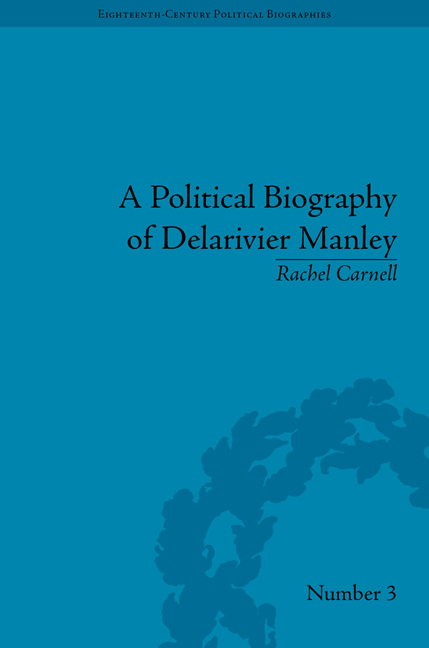Book contents
- Frontmatter
- CONTENTS
- The Author
- Dedication
- Acknowledgements
- A Note on Dates
- Manley Family Tree
- Introduction
- 1 ‘A Long Untainted Descent’: Her Father's Daughter?
- 2 Roger Manley: ‘A Scholar in the Midst of a Camp’
- 3 A ‘Liberal Education’: Youth and Early Life in London
- 4 A ‘Female Wit’: 1694–6
- 5 ‘Some More [and Less] Profitable Employ’: 1697–1705
- 6 Not Yet a Propaganda Writer: 1705–8
- 7 ‘[T]hrowing the First Stone’: 1709
- 8 Writing under a Tory Ministry: 1710–14
- 9 A Celebrated ‘Muse’: 1714–24
- Notes
- Works Cited
- Index
2 - Roger Manley: ‘A Scholar in the Midst of a Camp’
- Frontmatter
- CONTENTS
- The Author
- Dedication
- Acknowledgements
- A Note on Dates
- Manley Family Tree
- Introduction
- 1 ‘A Long Untainted Descent’: Her Father's Daughter?
- 2 Roger Manley: ‘A Scholar in the Midst of a Camp’
- 3 A ‘Liberal Education’: Youth and Early Life in London
- 4 A ‘Female Wit’: 1694–6
- 5 ‘Some More [and Less] Profitable Employ’: 1697–1705
- 6 Not Yet a Propaganda Writer: 1705–8
- 7 ‘[T]hrowing the First Stone’: 1709
- 8 Writing under a Tory Ministry: 1710–14
- 9 A Celebrated ‘Muse’: 1714–24
- Notes
- Works Cited
- Index
Summary
Delarivier Manley writes of her father: ‘none could be more Brave, more Loyal, more Virtuous’. Certainly her father, whom she describes as ‘a Scholar in the Midst of a Camp’ must have been courageous; he also clearly enjoyed sharing the narratives of his adventures. As an officer in Lord Byron's regiment during the Civil War, while still a young man, Roger Manley was taken prisoner at the capture of Powys Castle in early October 1644, but made a daring solitary escape, which he describes in a letter to his commanding officer. He begins by describing how the enemy ‘possessed themselves of the whole Castell’ and then offered ‘faire quarter to our Men which they gladly received’. Manley, however, fared better than the rest, in part because he was captured early in the fray and then ‘comitted to the custody of one of their musketeers’. Manley managed to get the advantage of this musketeer, and ‘sorted his Musket from him with their word’ – presumably their password – ‘by which helpes’ he ‘passed through their Guards and soe escaped’. As he describes to Lord Byron, there were ‘none escaping but myself that I heare of ’.
Manley appears to have been daring and clever, but also lucky, in his escape from this ‘castle’ (more accurately described as a fortified country house when compared with the forts and castles Manley would subsequently administer). Without questioning his actual courage, we might observe that he plays up his bravery in his description of what happened to him after his escape. In his narrative to Byron, Manley describes his subsequent ‘flight in the countrey’ where, he writes, he ‘mett at least with a hundred of the country people … some of them suspecting mee’. Those ‘country people’ that he believes suspected him, he then asserts, ‘would have laid hands upon mee and soe have conveyd mee to Middleton’ – i.e. John Middleton (1608–74), a major-general in the Parliamentary army. Whether or not anyone in fact intended him harm or did lay hands on him is unclear.
- Type
- Chapter
- Information
- A Political Biography of Delarivier Manley , pp. 23 - 50Publisher: Pickering & ChattoFirst published in: 2014



